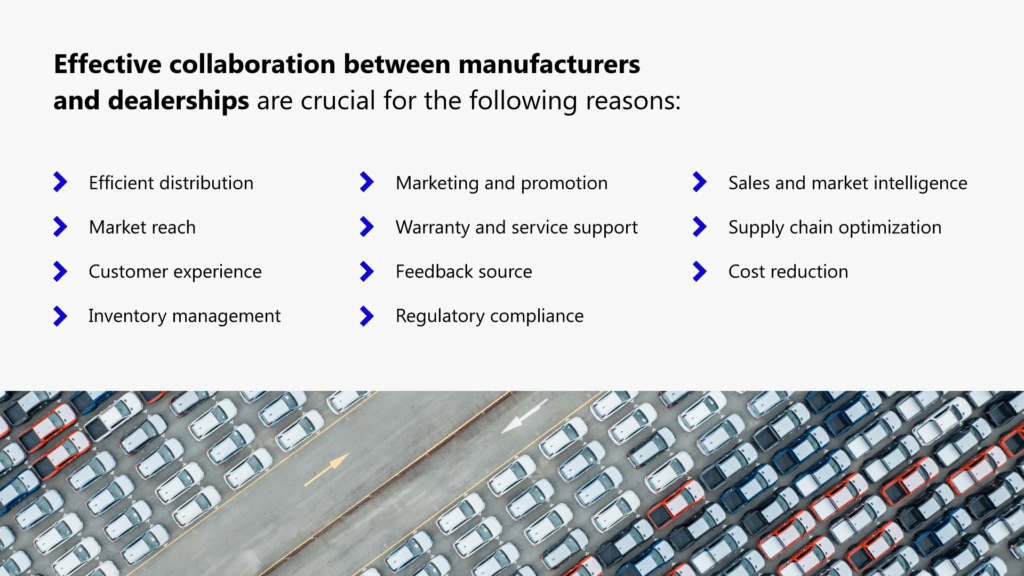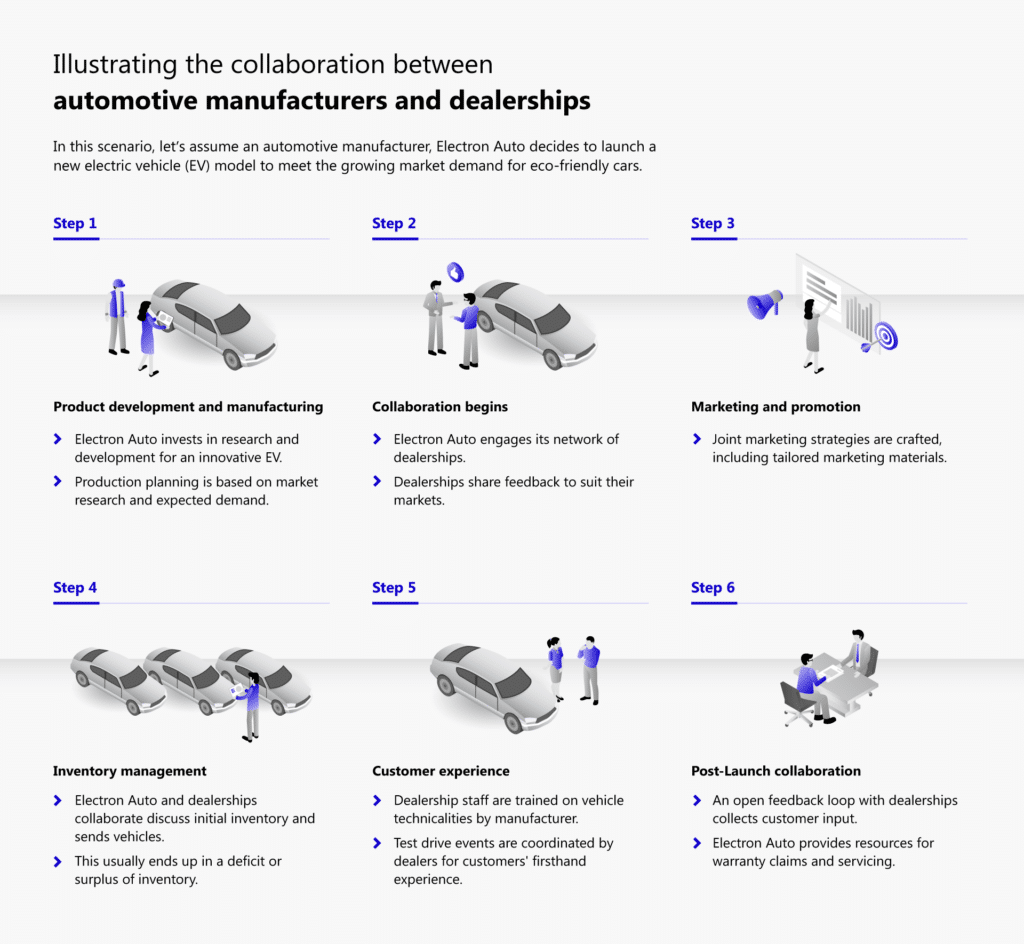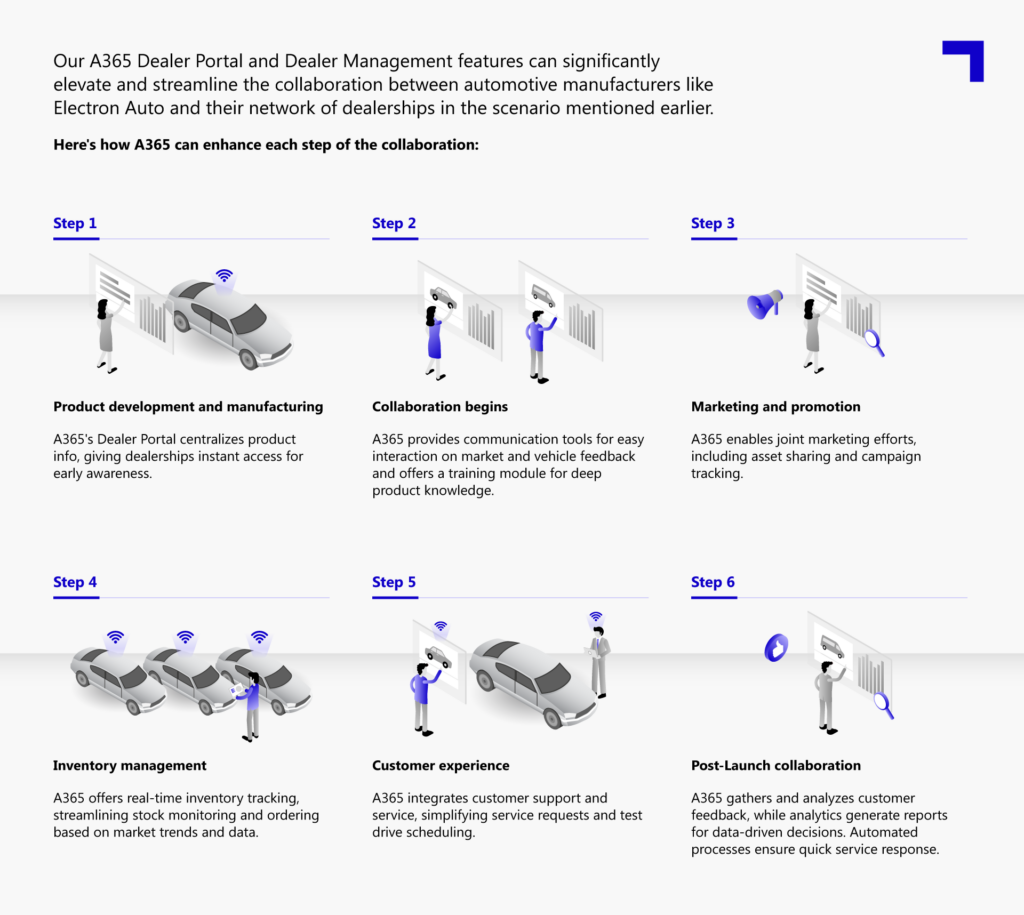Effective collaboration between manufacturers and dealerships is absolutely vital within the automotive landscape. Manufacturers need to get their products to dealerships smoothly, while dealerships require support, information, and resources from manufacturers to serve their customers effectively.
This collaboration isn’t just a nice-to-have; it’s a must in the automotive industry. It enhances market reach, improves customer experiences, optimizes inventory management, and fosters innovation. Ultimately, it contributes to the success and competitiveness of both manufacturers and dealerships in a highly competitive and dynamic industry.
The need for manufacturer-dealer collaboration
Working together, both manufacturers and dealerships in the automotive industry play a critical role for various reasons:

1.Efficient distribution: Manufacturers produce vehicles and parts on a large scale and rely on dealers to get these products into the hands of customers. Collaboration ensures a smooth and efficient distribution process, allowing manufacturers to reach a broader customer base.
2. Market reach: Manufacturers may not have the local presence and market knowledge that dealerships possess. By working closely together, manufacturers can leverage dealerships’ expertise to identify and cater to specific customer needs in different regions or markets.
3. Customer experience: Dealerships link manufacturers with customers. Collaboration ensures dealerships have product knowledge, leading to improved customer experiences. They provide accurate information, arrange test drives, and offer maintenance services and support.
4. Inventory management: Manufacturers need to produce vehicles and parts based on market demand. Collaboration facilitates better inventory coordination. Dealerships can share requirements, and manufacturers can adjust production to avoid overstocking or stockouts.
5. Marketing and promotion: Joint marketing efforts between manufacturers and dealerships can amplify marketing campaign reach and impact. Strong collaboration ensures consistent branding and messaging across the dealer network, promoting cohesive customer experiences.
6. Warranty and service support: Manufacturers are responsible for warranty support and technical expertise. Dealerships handle warranty claims and provide maintenance and repair services. Effective collaboration ensures efficient claims processes and timely customer service.
7. Feedback source: Dealerships are a valuable source of feedback from customers. They can relay customer preferences, concerns, and market trends back to manufacturers. This information is vital for product improvement and innovation.
8. Regulatory compliance: The industry is subject to numerous regulations and standards. Manufacturers must ensure their products and dealerships comply with these regulations. Collaboration helps keep track of regulatory changes and ensure all parties adhere to them.
9. Sales and market intelligence: Dealerships gather valuable data on customer buying habits and preferences. Manufacturers can use this knowledge to fine-tune their offerings and make sure they’re pricing things right.
10. Supply chain optimization: Manufacturers have complex supply chains, and dealerships can offer insights into demand changes. This helps manufacturers keep their supply chain running smoothly and while costs down.
11. Cost reduction: Collaboration can lead to cost reduction opportunities. Manufacturers and dealerships can work together to streamline processes, reduce redundant activities, and negotiate better terms with suppliers, ultimately lowering operational costs.
Dealer management solution is key to enhanced collaborations
Although we have established that effective communication and seamless collaboration are vital components of this partnership, this can most often be a challenge for automotive businesses. To facilitate this, dealer management tools and platforms have become indispensable. These solutions serve as the connective tissue between manufacturers and dealerships, bridging gaps and optimizing operations.
Dealer management tools empower both manufacturers and dealerships by providing a centralized hub for information exchange, inventory management, and performance tracking. These platforms ensure that everyone involved is on the same page, with access to real-time data and insights.
By leveraging dealer management tools, the automotive industry can enhance efficiency, improve customer experiences, and adapt to market dynamics with agility. Manufacturers and dealerships can navigate the complexities of the automotive landscape while delivering top-notch products and services to their customers.
Streamline collaboration with A365
This is where Annata’s A365 solution comes into play, with our robust dealer portal and management tools designed to streamline this critical collaboration, ultimately leading to improved efficiency and communication. A365’s capabilities include:

- Centralized information hub
Our dealer portal functionality in A365 serves as a centralized hub where manufacturers can securely share essential information with their network of dealerships. This includes product updates, marketing materials, pricing information, and any other data necessary for dealers to stay informed and up-to-date.
Having a central repository ensures that all dealers have access to the latest and most accurate information, reducing the risk of miscommunication and outdated materials.
- Real-time inventory visibility
One of the key challenges in the automotive industry is managing inventory effectively. A365’s dealer portal provides real-time visibility into inventory levels at both the manufacturer and dealership levels.
Dealers can check stock availability, place orders, and track deliveries effortlessly, reducing the likelihood of overstocking or stockouts. Manufacturers, in turn, can monitor demand trends and adjust production accordingly, optimizing their supply chain operations.
- Order and supply chain management
A365’s management tools extend to order and supply chain management. Dealerships can place orders directly through the portal, which are then seamlessly integrated into the manufacturer’s production and distribution processes.
This automation reduces manual data entry, minimizes errors, and accelerates order fulfillment, ensuring that dealers receive the products they need promptly.
- Communication enhancement
Effective communication is the cornerstone of successful collaboration. A365 provides communication tools such as messaging, notifications, and alerts within the dealer portal.
Manufacturers can easily communicate product recalls, quality improvements, and other critical information to dealerships in real-time. This fosters a transparent and proactive approach to addressing issues and maintaining quality standards.
- Performance analytics
A365’s reporting and analytics features allow both manufacturers and dealerships to monitor their performance and key metrics. Manufacturers can assess the performance of individual dealerships, identify areas of improvement, and offer targeted support. Dealerships can track their sales, inventory turnover, and customer satisfaction, making data-driven decisions to enhance their operations.
- Training and support resources
To ensure that dealerships are well-equipped to represent their products effectively, manufacturers can use A365’s dealer portal to provide training materials, documentation, and support resources.
This helps dealers stay knowledgeable about the latest product features and innovations, ultimately leading to better customer service.
- Customization and scalability
A365 is highly customizable, allowing manufacturers to tailor the portal to their specific needs and branding. Whether it’s creating unique dashboards, incorporating custom reports, or adapting the user interface to align with their corporate identity, A365 offers flexibility to accommodate diverse manufacturer-dealership relationships.
Moreover, the solution is scalable and capable of accommodating a growing network of dealerships as businesses expand.

Through this collaborative process, Electron Auto and its network of dealerships successfully launched the new EV model. The manufacturer benefits from localized market insights, efficient inventory management, and coordinated marketing efforts, while dealerships gain access to a high-quality product, training, and support, ultimately enhancing the customer experience. This synergy between manufacturer and dealership contributes to the overall success of the product in the market.

In summary, A365 Dealer Portal and Dealer Management features act as a comprehensive, integrated platform that streamlines every aspect of collaboration between manufacturers like Electron Auto and their dealer network. It centralizes information sharing, communication, training, marketing efforts, inventory management, customer support, and post-launch feedback analysis.
This enhanced collaboration leads to greater efficiency, improved customer experiences, and data-driven decision-making, ultimately contributing to the success of the product in the market.
To learn more about how we facilitate collaboration between manufacturers and dealers, please explore our website or reach out to one of our consultants today to discuss your manufacturer-dealer requirements.








